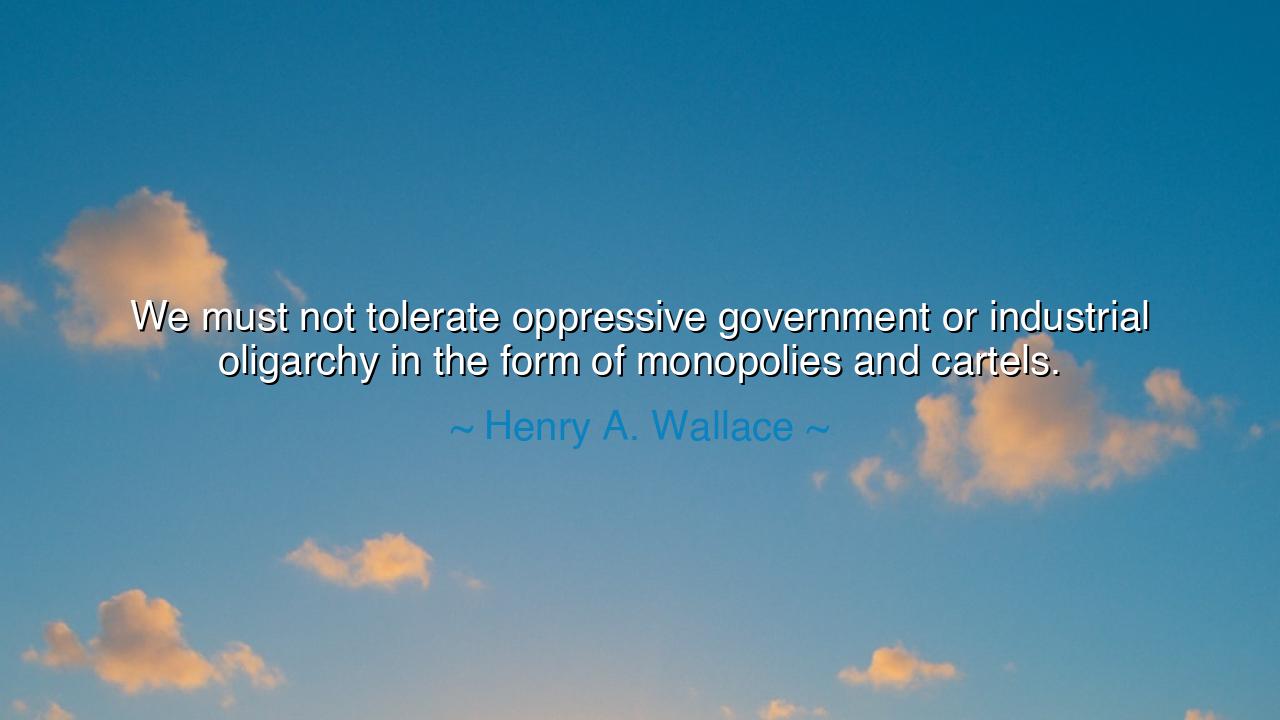
We must not tolerate oppressive government or industrial
We must not tolerate oppressive government or industrial oligarchy in the form of monopolies and cartels.






The words of Henry A. Wallace, once Vice President of the United States and a tireless defender of human dignity, resound like a trumpet call against tyranny: “We must not tolerate oppressive government or industrial oligarchy in the form of monopolies and cartels.” In these few lines, Wallace strikes at the heart of a timeless struggle—the battle between freedom and control, between the creative power of the people and the suffocating grasp of concentrated power. His warning is not bound to any one century; it speaks to all ages. For wherever men forget this truth, liberty withers, and the promise of democracy becomes a hollow echo.
To understand Wallace’s conviction, one must see the world through the eyes of a man who lived through the Great Depression and World War II. He had witnessed the misery caused when wealth and power were hoarded by a few, when monopolies and cartels manipulated markets, crushed small farmers, and bent governments to their will. In his time, industrial titans dictated wages, prices, and even laws, while the poor and the working class struggled merely to survive. Wallace saw clearly that such economic tyranny is no less dangerous than political tyranny—for both destroy the same sacred thing: the right of a human being to live in dignity and freedom.
The essence of his quote lies in the idea that oppression wears many masks. Sometimes it comes wearing the face of a dictator, silencing dissent and ruling through fear. But other times, it comes dressed in the fine suit of commerce, speaking of “efficiency” and “progress,” while behind the curtain it monopolizes opportunity and enslaves the spirit of enterprise. When power—whether political or industrial—rests in too few hands, the common good becomes a tool for private gain. Wallace’s warning was prophetic, for even now, in the modern age of technology and global corporations, the shadow of industrial oligarchy still looms over humanity.
Consider the story of Standard Oil in the early twentieth century, led by John D. Rockefeller. What began as a vision of progress grew into an empire that controlled over 90% of America’s oil industry. Prices were fixed, competitors were crushed, and the marketplace—once a field of innovation—became a cage of control. It was only through the courage of reformers and the Sherman Antitrust Act that this giant was finally broken apart. That battle, though waged a century ago, stands as a living testament to Wallace’s words: when power grows unchecked, it is the people who pay the price.
Wallace, too, understood that freedom is not self-sustaining. It must be guarded, renewed, and defended—not just from tyrants who rule by force, but from those who rule through wealth and influence. For monopolies, like monarchs, seek not fairness but permanence. They devour competition and demand obedience. A society that permits them becomes divided—between the few who own, and the many who serve. To tolerate oppression in any form—whether from government or industry—is to betray the very spirit of democracy. Liberty dies not with a single blow, but by a thousand small compromises with greed.
The wisdom of this quote is not confined to economics; it speaks to the soul of governance. Wallace calls us to recognize that justice and equality are not guaranteed by constitutions alone. They live only when citizens remain vigilant—when they refuse to bow to concentrated power, no matter its disguise. He reminds us that both political and economic systems exist to serve the people, not to dominate them. When the state becomes oppressive or the marketplace becomes rigged, reform is not merely an option—it is a moral duty.
The lesson, therefore, is both practical and sacred: never surrender the balance of power. Demand transparency from your leaders and fairness from your institutions. Support small creators, local businesses, and those who dare to compete against giants. Question systems that reward greed over contribution. Teach your children that liberty is not the gift of the powerful—it is the birthright of the free. For if citizens grow indifferent, monopolies will rise again, and with them will return the silent chains of dependence.
Let Wallace’s words be remembered as a covenant between generations: freedom cannot coexist with domination. Whether it is the iron hand of government or the invisible grip of monopoly, oppression in any form must be resisted with courage and unity. The health of a nation lies not in the size of its corporations, but in the strength of its conscience. So long as men and women refuse to be ruled by fear or greed, the dream of democracy will endure—and liberty, once kindled, will never be extinguished.






AAdministratorAdministrator
Welcome, honored guests. Please leave a comment, we will respond soon